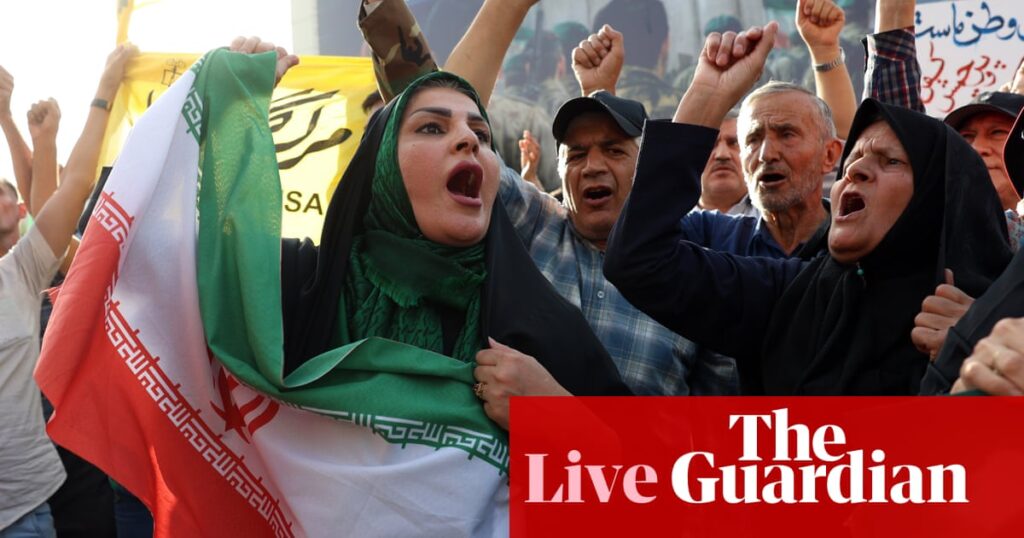
WASHINGTON, D.C. – In a dramatic escalation of rhetoric, U.S. President Donald Trump suggested a regime change in Iran following recent military strikes by the U.S. and Israel on key Iranian military sites.
Breaking: Trump’s Call for Change
President Trump took to his social media platform, Truth Social, to propose a regime change in Iran, framing it as a move to “make Iran great again.” This comes in the wake of U.S. military actions over the weekend targeting Iran’s nuclear capabilities, despite assurances from top U.S. officials that regime change is not the objective.
“It’s not politically correct to use the term, ‘Regime Change,’ but if the current Iranian Regime is unable to MAKE IRAN GREAT AGAIN, why wouldn’t there be a Regime change??? MIGA!!!” – Donald Trump
Immediate Impact
The world is on edge as Iran prepares to respond to what is being described as the largest Western military action against the Islamic Republic since 1979. Iranian Foreign Minister Abbas Araqchi, speaking from Istanbul, declared that Iran would not return to diplomacy until it had retaliated against the U.S. and Israel.
Meanwhile, Israeli Prime Minister Benjamin Netanyahu stated that Israel is close to achieving its objectives of neutralizing Iranian ballistic missile and nuclear threats. He emphasized the precision and necessity of the ongoing military operations.
Key Details Emerge
In a joint statement, the UK, France, and Germany urged Iran to engage in negotiations to address concerns surrounding its nuclear program. They also implored Iran to refrain from actions that could destabilize the region further.
The Iranian Health Ministry reported injuries from the U.S. strikes but noted no signs of radioactive contamination. Israel confirmed its fighter jets targeted dozens of sites across Iran, including a strategic missile command center in Yazd.
By the Numbers
– Approximately 30 Israeli Air Force jets involved
– The strikes targeted dozens of military sites
– The ASX lost over $10 billion in market value following the strikes
Expert Analysis
U.S. Secretary of State Marco Rubio stated there are no further planned military operations against Iran, though the full impact of the strikes remains unclear. Defense Secretary Pete Hegseth praised the precision of the strikes, claiming they effectively targeted Iran’s nuclear capabilities.
New Zealand’s Foreign Minister Winston Peters expressed concern over the strikes, emphasizing the need for evidence of Iran’s nuclear activities to justify such actions. He called for a diplomatic resolution to prevent further escalation.
Regional Implications
Australian Prime Minister Anthony Albanese voiced support for the U.S. strikes while calling for diplomacy and de-escalation. Meanwhile, reports from Gaza indicate continued violence, with Israeli forces reportedly targeting Palestinian camps.
Iran’s UN Ambassador Amir Saeid Iravani accused the U.S. of undermining diplomacy, while Iran’s Supreme Leader Ayatollah Ali Khamenei’s social media account condemned Israel’s actions as a “grave mistake.”
Timeline of Events
– U.S. strikes on Iranian nuclear sites over the weekend
– Iran threatens retaliation and halts diplomatic efforts
– Israel continues military operations in Iran
– Global markets react with significant losses
What Comes Next
As tensions remain high, the international community watches closely for Iran’s next move. The U.S. State Department has issued a “worldwide caution” for Americans abroad, highlighting potential security risks. The situation remains fluid, with diplomatic efforts and military readiness both in play.
The unfolding events underscore the complexity and volatility of the geopolitical landscape in the Middle East, with potential far-reaching consequences for global security and economic stability.




